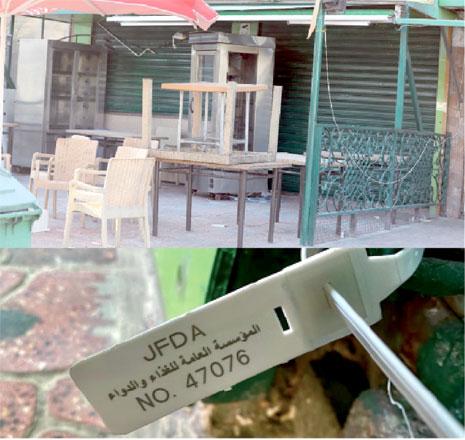- Local News
- Web-2020-08-05 | 03:57 pm

In the Ein Al Basha region in Balqa, a restaurant was "preparing food outside the refrigeration unit without abiding by health rules,” Health Minister Saad Jaber said on Monday.
The ministry’s inspection team later seized and destroyed around 150 kilogrammes of spoiled meat from the restaurant.
Since then, the Jordan Food and Drug Association has carried out 86 field visits that resulted in the shutting down of three facilities, the issuance of 67 warnings and the suspension of nine food establishments.
The association also destroyed 926 kilogrammes of solid materials that were "not suitable for human consumption” and seized 14.5 tonnes of food, according to a statement.
Prime Minister and Minister of Defence Omar Razzaz instructed the formation of a team, headed by the Minister of Higher Education and Scientific Research Mohiuddin Touq, to "investigate the causes of the poisoning incident, as well as, check up on the validity of foodstuffs in warehouses, storage vehicles and restaurants”.
In addition to the Minister of Higher Education and Scientific Research, the team includes the Minister of Water and Irrigation, the Minister of Justice, the president of the University of Science and Technology, and the vice president of the Royal Scientific Society.
The prime minister instructed the team to "use all available sources to identify the shortcomings of any involved entities, whether private or public, so that they are held responsible in accordance with the provisions of law”.
Razzaz set a two-week deadline for the team to complete the tasks assigned.
The Director General of the Jordan Food and Drug Association Nizar Mheidat said in a TV interview on Monday that since last Saturday, all shawarma restaurants have been closed in Sweileh and Ein Al Basha "as a precaution”.
"The chicken that was seized in the supply centre is from a local source," added Mheidat in reference to online reports that the chicken was imported from Ukraine.
The head of the Amman Chamber of Commerce Khalil Haj Tawfiq echoed Mheidat’s statements saying that the chicken seized in the warehouse in Ein Al Basha was from "a large local factory that produces poultry and is not of Ukrainian origin as some claim.”
Haj Tawfiq said on his personal Facebook page that the judiciary "will determine the cause of poisoning and where the neglect occurred and then hold every person that was involved in risking the health of citizens responsible”.
The Ministry of Agriculture previously denied that the chicken is of Ukrainian origin, stressing that chicken imports from the country were suspended after a case of H1N1 bird flu recorded in January.
The Ministry of Agriculture also announced on Monday that it destroyed and returned 3,366 tonnes of foodstuffs that did "not conform to the Jordanian standard”, during the first half of 2020.
"These imported consignments include plant and animal products,” said a ministry statement.
The statement noted that the Ministry of Agriculture "has 14 specialised border centres with qualified and trained cadres to examine all types of food imports”.









